Submitted:
03 January 2024
Posted:
09 January 2024
You are already at the latest version
Abstract
Keywords:
INTRODUCTION
THEORETICAL FUNDATIONS
CONTROL SYSTEM
ENGINEERING DESIGN
SIMULATION

| Configuration | A | B | C | D |
|---|---|---|---|---|
| Low | 6.758 | 3.296 | 8.237 | 4.941 |
CONCLUSIONS
References
- Ogura, K., & Kolhe, M. L. (2017). Battery technologies for electric vehicles. In Electric Vehicles: Prospects and Challenges (pp. 139-167). Elsevier. [CrossRef]
- Chen, X., Shen, W., Vo, T. T., Cao, Z., & Kapoor, A. (2012, December). An overview of lithium-ion batteries for electric vehicles. In 2012 10th International Power & Energy Conference (IPEC) (pp. 230-235). IEEE. [CrossRef]
- Liu, W.; Placke, T.; Chau, K. Overview of batteries and battery management for electric vehicles. Energy Rep. 2022, 8, 4058–4084. [CrossRef]
- Kennedy, B.; Patterson, D.; Camilleri, S. Use of lithium-ion batteries in electric vehicles. J. Power Sources 2000, 90, 156–162. [CrossRef]
- Lowe, M., Tokuoka, S., Trigg, T., & Gereffi, G. (2010). Lithium-ion batteries for electric vehicles. The US Value Chain, Contributing CGGC researcher: Ansam Abayechi.
- Zeng, X.; Li, M.; Abd El-Hady, D.; Alshitari, W.; Al-Bogami, A.S.; Lu, J.; Amine, K. Commercialization of Lithium Battery Technologies for Electric Vehicles. Adv. Energy Mater. 2019, 9, 1900161. [CrossRef]
- Diouf, B.; Pode, R. Potential of lithium-ion batteries in renewable energy. Renew. Energy 2015, 76, 375–380. [CrossRef]
- Perner, A., & Vetter, J. (2015). Lithium-ion batteries for hybrid electric vehicles and battery electric vehicles. In Advances in battery technologies for electric vehicles (pp. 173-190). Woodhead Publishing. [CrossRef]
- Vidyanandan, K. V. (2019). Batteries for electric vehicles. Power Management Institute.
- Lai, X.; Chen, Q.; Tang, X.; Zhou, Y.; Gao, F.; Guo, Y.; Bhagat, R.; Zheng, Y. Critical review of life cycle assessment of lithium-ion batteries for electric vehicles: A lifespan perspective. eTransportation 2022, 12. [CrossRef]
- Lu, L.; Han, X.; Li, J.; Hua, J.; Ouyang, M. A review on the key issues for lithium-ion battery management in electric vehicles. J. Power Sources 2013, 226, 272–288. [CrossRef]
- Affanni, A.; Bellini, A.; Franceschini, G.; Guglielmi, P.; Tassoni, C. Battery Choice and Management for New-Generation Electric Vehicles. IEEE Trans. Ind. Electron. 2005, 52, 1343–1349. [CrossRef]
- C. Armenta-Déu, J.P. Carriquiry, S. Guzmán (2019) Capacity correction factor for Li-ion batteries: Influence of the discharge rate. Journal of Energy Storage, Volume 25, October 2019, 100839. [CrossRef]
- C. Armenta-Déu (2021) Reduction of Electric Vehicle Driving Range due to Battery Capacity Fading. Journal of Automobile Engineering and Applications, Volume 8, Issue 2. [CrossRef]
- Atalay, S.; Sheikh, M.; Mariani, A.; Merla, Y.; Bower, E.; Widanage, W.D. Theory of battery ageing in a lithium-ion battery: Capacity fade, nonlinear ageing and lifetime prediction. J. Power Sources 2020, 478, 229026. [CrossRef]
- Broussely, M.; Biensan, P.; Bonhomme, F.; Blanchard, P.; Herreyre, S.; Nechev, K.; Staniewicz, R. Main aging mechanisms in Li ion batteries. J. Power Sources 2005, 146, 90–96. [CrossRef]
- Fernández, I.; Calvillo, C.; Sánchez-Miralles, A.; Boal, J. Capacity fade and aging models for electric batteries and optimal charging strategy for electric vehicles. Energy 2013, 60, 35–43. [CrossRef]
- Omar, N., Firouz, Y., Gualous, H., Salminen, J., Kallio, T., Timmermans, J. M., ... & Van Mierlo, J. (2015). Aging and degradation of lithium-ion batteries. In Rechargeable lithium batteries (pp. 263-279). Woodhead Publishing. [CrossRef]
- Keil, P.; Jossen, A. Aging of Lithium-Ion Batteries in Electric Vehicles: Impact of Regenerative Braking. World Electr. Veh. J. 2015, 7, 41–51. [CrossRef]
- Collath, N.; Tepe, B.; Englberger, S.; Jossen, A.; Hesse, H. Aging aware operation of lithium-ion battery energy storage systems: A review. J. Energy Storage 2022, 55. [CrossRef]
- M. Martínez-Arriaga, C. Armenta-Déu (2020) Simulation of the Performance of Electric Vehicle Batteries under variable Driving Conditions. Journal of Automobile Engineering and Applications, Volume 7, Issue 3, Pages 1-15.
- L. García-Arranz, C. Armenta-Déu (2021) Performance Tests to Determine Driving Range in Electric Vehicles. Journal of Mechatronics and Automation, Volume 8, Issue 2, pages 10-20. [CrossRef]
- Desantes, J.; Novella, R.; Pla, B.; Lopez-Juarez, M. Effect of dynamic and operational restrictions in the energy management strategy on fuel cell range extender electric vehicle performance and durability in driving conditions. Energy Convers. Manag. 2022, 266. [CrossRef]
- Al-Wreikat, Y.; Serrano, C.; Sodré, J.R. Driving behaviour and trip condition effects on the energy consumption of an electric vehicle under real-world driving. Appl. Energy 2021, 297, 117096. [CrossRef]
- Szumska, E.M.; Jurecki, R.S. Parameters Influencing on Electric Vehicle Range. Energies 2021, 14, 4821. [CrossRef]
- Varga, B.O.; Sagoian, A.; Mariasiu, F. Prediction of Electric Vehicle Range: A Comprehensive Review of Current Issues and Challenges. Energies 2019, 12, 946. [CrossRef]
- C. Armenta-Déu, B. Boucheix (2022) Seasonal Temperature Impact on the Driving Range of Electric Vehicles: Effects on Carbon Emissions Saving. Journal of Alternate Energy Sources and Technology, Volume 12, Issue 2, pages 10-34.
- C. Armenta-Déu, B. Giorgi (2022) Influence of Climatic Changes onto the Performance of Electric Vehicles. Journal of Automobile Engineering and Applications, Volume 9, Issue 2, pages 43-58.
- C. Armenta-Déu, B. Boucheix (2023) Evaluation of Lithium-Ion Battery Performance Under Variable Climatic Conditions: Influence on the Driving Range of Electric Vehicles. Future Transportation, 3, 535-551. [CrossRef]
- C. Armenta-Déu, B. Giorgi (2023) Analysis of Influence of Variable Meteorological Conditions on Driving Range. Future Transportation, 3, 626-642. [CrossRef]
- Steinstraeter, M.; Heinrich, T.; Lienkamp, M. Effect of Low Temperature on Electric Vehicle Range. World Electr. Veh. J. 2021, 12, 115. [CrossRef]
- Belt, J.R.; Ho, C.D.; Miller, T.J.; Habib, M.A.; Duong, T.Q. The effect of temperature on capacity and power in cycled lithium ion batteries. J. Power Sources 2005, 142, 354–360. [CrossRef]
- Lu, Z.; Yu, X.; Wei, L.; Cao, F.; Zhang, L.; Meng, X.; Jin, L. A comprehensive experimental study on temperature-dependent performance of lithium-ion battery. Appl. Therm. Eng. 2019, 158, 113800. [CrossRef]
- Bandhauer, T.M.; Garimella, S.; Fuller, T.F. A Critical Review of Thermal Issues in Lithium-Ion Batteries. J. Electrochem. Soc. 2011, 158, R1. [CrossRef]
- M. Hanako Olmedilla.Ishishi, C. Armenta-Déu (2020) Seasonal Variation of Electric Vehicle Autonomy: Application to AC/DC Dual Voltage Operation. Journal of Mechatronics and Automation, Volume 7, Issue 3, pages 1-16. [CrossRef]
- Lu, Z.; Yu, X.; Zhang, L.; Meng, X.; Wei, L.; Jin, L. Experimental investigation on the charge-discharge performance of the commercial lithium-ion batteries. Energy Procedia 2017, 143, 21–26. [CrossRef]
- Ma, S.; Jiang, M.; Tao, P.; Song, C.; Wu, J.; Wang, J.; Deng, T.; Shang, W. Temperature effect and thermal impact in lithium-ion batteries: A review. Prog. Nat. Sci. 2018, 28, 653–666. [CrossRef]
- Testing and Assessment Protocol Release 2.0». FIA Foundation. Updated on 20th, April, 2012.
- Emission Test Cycles ECE 15 + EUDC / NEDC». DieselNet.
- New European Driving Cycle. https://en.wikipedia.org/wiki/New_European_Driving_Cycle [Accessed online: 20/12/2023].
- Worldwide harmonized Light vehicles Test Procedure (WLTP) - Transport - Vehicle Regulations - UNECE Wiki”. wiki.unece.org.
- WLTPfacts.eu - Worldwide Harmonised Light Vehicle Test Procedure”. WLTPfacts.eu.
- Worldwide Harmonised Light Vehicles Test Procedure. https://en.wikipedia.org/wiki/Worldwide_Harmonised_Light_Vehicles_Test_Procedure [Accessed online: 20/12/2023 ].
- Dynamometer Drive Schedules”. US EPA. Retrieved 26 April 2014.
- DieselNet Emission Test Cycles - FTP-75.
- FTP-75. https://en.wikipedia.org/wiki/FTP-75#cite_note-EPA_cycles-5 [Accessed online: 20/12/2023].
- Japan Automobile Manufacturers Association (JAMA) (2009). “From 10•15 to JC08: Japan’s new economy formula”. News from JAMA. Retrieved 9 April 2012. Issue No. 2, 2009.
- Prius Certified to Japanese 2015 Fuel Economy Standards with JC08 Test Cycle”. Green Car Congress. 11 August 2007. Retrieved 9 April 2012.
- Japanese JC08Test. Fuel Economy in automobiles. https://en.wikipedia.org/wiki/Fuel_economy_in_automobiles#JC08 [Accessed online: 20/12/2023].
- Emissions Tests Explained. Rivervale. https://www.rivervaleleasing.co.uk/guides/leasing-overview/difference-between-wltp-and-nedc-emissions-tests-explained [Accessed online: 20/12/2023].
- Lee, H.; Lee, K. Comparative Evaluation of the Effect of Vehicle Parameters on Fuel Consumption under NEDC and WLTP. Energies 2020, 13, 4245. [CrossRef]
- Liu, X.; Zhao, F.; Hao, H.; Chen, K.; Liu, Z.; Babiker, H.; Amer, A.A. From NEDC to WLTP: Effect on the Energy Consumption, NEV Credits, and Subsidies Policies of PHEV in the Chinese Market. Sustainability 2020, 12, 5747. [CrossRef]
- Koszałka, G.; Szczotka, A.; Suchecki, A. Comparison of fuel consumption and exhaust emissions in WLTP and NEDC procedures. Combust. Engines 2019, 179, 186–191. [CrossRef]
- Karamangil, M.I.; Tekin, M. Comparison of fuel consumption and recoverable energy according to NEDC and WLTP cycles of a vehicle. CT&F-Ciencia, Tecnología y Futuro 2022, 12, 31–38. [CrossRef]
- WLTP cycle replaces NEDC.Eurococ. https://www.eurococ.eu/en/blog/wltp-cycle-replaces-nedc/#:~:text=The%20WLTP%20simulates%20the%20real,reflect%20real-world%20driving%20conditions.
- Peter Kasten, Ruth Blanck (2017) The changeover from the NEDC to the WLTP and its impact on the effectiveness and the post-2020 update of the CO2 emission standards. Öko-Institut.
- Leard, B., & McConnell, V. Progress and potential for electric vehicles to reduce carbon emissions (No. 20-24). Washington, DC, USA: Resources for the Future.
- Canals Casals, L.; Martinez-Laserna, E.; Amante García, B.; Nieto, N. Sustainability analysis of the electric vehicle use in Europe for CO2 emissions reduction. J. Clean. Prod. 2016, 127, 425–437. [CrossRef]
- Mehlig, D.; Staffell, I.; Stettler, M.; ApSimon, H. Accelerating electric vehicle uptake favours greenhouse gas over air pollutant emissions. Transp. Res. Part D: Transp. Environ. 2023, 124. [CrossRef]
- Ghosh, A. Possibilities and Challenges for the Inclusion of the Electric Vehicle (EV) to Reduce the Carbon Footprint in the Transport Sector: A Review. Energies 2020, 13, 2602. [CrossRef]
- Fuinhas, J.A.; Koengkan, M.; Leitão, N.C.; Nwani, C.; Uzuner, G.; Dehdar, F.; Relva, S.; Peyerl, D. Effect of Battery Electric Vehicles on Greenhouse Gas Emissions in 29 European Union Countries. Sustainability 2021, 13, 13611. [CrossRef]
- Afkhami, B.; Akbarian, B.; Ansari, E. Adoption of battery electric vehicles for reduction of greenhouse gases and air pollutant emissions: A case study of the United States. Energy Storage 2021, 4, e280. [CrossRef]
- Ajanovic, A.; Haas, R. Dissemination of electric vehicles in urban areas: Major factors for success. Energy 2016, 115, 1451–1458. [CrossRef]
- Kester, J.; Noel, L.; de Rubens, G.Z.; Sovacool, B.K. Policy mechanisms to accelerate electric vehicle adoption: A qualitative review from the Nordic region. Renew. Sustain. Energy Rev. 2018, 94, 719–731. [CrossRef]
- Adhikari, M.; Ghimire, L.P.; Kim, Y.; Aryal, P.; Khadka, S.B. Identification and Analysis of Barriers against Electric Vehicle Use. Sustainability 2020, 12, 4850. [CrossRef]
- Panwar, U., Kumar, A., & Chakrabarti, D. Barriers in implementation of electric vehicles in India. International Journal of Electric and Hybrid Vehicles 2019, 11, 195-204. [CrossRef]
- Chidambaram, K.; Ashok, B.; Vignesh, R.; Deepak, C.; Ramesh, R.; Narendhra, T.M.; Usman, K.M.; Kavitha, C. Critical analysis on the implementation barriers and consumer perception toward future electric mobility. Proc. Inst. Mech. Eng. Part D: J. Automob. Eng. 2022, 237, 622–654. [CrossRef]
- Sopha, B.M.; Purnamasari, D.M.; Ma’mun, S. Barriers and Enablers of Circular Economy Implementation for Electric-Vehicle Batteries: From Systematic Literature Review to Conceptual Framework. Sustainability 2022, 14, 6359. [CrossRef]
- Mahdavian, A.; Shojaei, A.; Mccormick, S.; Papandreou, T.; Eluru, N.; Oloufa, A.A. Drivers and Barriers to Implementation of Connected, Automated, Shared, and Electric Vehicles: An Agenda for Future Research. IEEE Access 2021, 9, 22195–22213. [CrossRef]
- Krishna, G. Understanding and identifying barriers to electric vehicle adoption through thematic analysis. Transp. Res. Interdiscip. Perspect. 2021, 10, 100364. [CrossRef]
- O’Neill, E.; Moore, D.; Kelleher, L.; Brereton, F. Barriers to electric vehicle uptake in Ireland: Perspectives of car-dealers and policy-makers. Case Stud. Transp. Policy 2018, 7, 118–127. [CrossRef]
- Falchetta, G.; Noussan, M. Electric vehicle charging network in Europe: An accessibility and deployment trends analysis. Transp. Res. Part D: Transp. Environ. 2021, 94, 102813. [CrossRef]
- Hall, D., Moultak, M., & Lutsey, N. (2017). Electric vehicle capitals of the world. ICCT White Paper.
- Trends incharging infrastructure. Global EV Outlook 22. International Energy Agency (IEA). https://www.iea.org/reports/global-ev-outlook-2022/trends-in-charging-infrastructure [Accessed online: 23/12/2023].
- Charging stations. Electromaps. A wallbox company. https://www.electromaps.com/en/charging-stations [Accessed online: 23/12/2023].
- AmpUp EV Charging”. www.ampup.io. [Accessed online: 23/12/2023].
- Electric vehicle charging network. https://en.wikipedia.org/wiki/Electric_vehicle_charging_network#cite_note-AmpUp-20 [Accessed online: 23/12/2023].
- EV Charging Stations Data. Eco-movement. https://www.eco-movement.com/charging-station-dataset-demo/?gclid=EAIaIQobChMIhpmk2cu1gwMVkpNoCR1VEQnJEAMYASAAEgJhpfD_BwE [Accessed online: 23/12/2023].
- Qawasmeh, B. R., Al-Salaymeh, A., Swaity, A., Mosleh, A., & Boshmaf, S. Investigation of performance characteristics of hybrid cars. Environmental Engineering 2017, 14, 59-69.
- Asfoor, M. S., Sharaf, A. M., & Beyerlein, S. (2014, May). Use of GT-Suite to study performance differences between internal combustion engine (ICE) and hybrid electric vehicle (HEV) powertrains. In The International Conference on Applied Mechanics and Mechanical Engineering (Vol. 16, No. 16th International Conference on Applied Mechanics and Mechanical Engineering., pp. 1-16). Military Technical College.
- Penina, N., Turygin, Y. V., & Racek, V. (2010, June). Comparative analysis of different types of hybrid electric vehicles. In 13th Mechatronika 2010 (pp. 102-104). IEEE.
- Elkelawy, M.; Mohamad, H.A.E.; Samadony, M.; Elbanna, A.M.; Safwat, A.M.S.M. A comparative study on developing the Hybrid-Electric Vehicle Systems and Its Future Expectation over the Conventional Engines cars. J. Eng. Res. 2022. [CrossRef]
- Awadallah, M., Tawadros, P., Walker, P., Zhang, N., & Tawadros, J. (2017, June). A Comparative Fuel Analysis of a novel HEV with conventional vehicle. In 2017 IEEE 85th vehicular technology conference (VTC Spring) (pp. 1-6). IEEE. [CrossRef]
- Dong, H.; Fu, J.; Zhao, Z.; Liu, Q.; Li, Y.; Liu, J. A comparative study on the energy flow of a conventional gasoline-powered vehicle and a new dual clutch parallel-series plug-in hybrid electric vehicle under NEDC. Energy Convers. Manag. 2020, 218, 113019. [CrossRef]
- Kumar, A.; Thakura, P.R. ADVISOR-Based Performance Analysis of a Hybrid Electric Vehicle and Comparison with a Conventional Vehicle. IETE J. Res. 2020, 69, 753–761. [CrossRef]
- Howey, D.; Martinez-Botas, R.; Cussons, B.; Lytton, L. Comparative measurements of the energy consumption of 51 electric, hybrid and internal combustion engine vehicles. Transp. Res. Part D: Transp. Environ. 2011, 16, 459–464. [CrossRef]
- Veza, I.; Asy’Ari, M.Z.; Idris, M.; Epin, V.; Fattah, I.R.; Spraggon, M. Electric vehicle (EV) and driving towards sustainability: Comparison between EV, HEV, PHEV, and ICE vehicles to achieve net zero emissions by 2050 from EV. Alex. Eng. J. 2023, 82, 459–467. [CrossRef]
- Doust, M.; Otkur, M. Carbon footprint comparison analysis of passenger car segment electric and ICE propelled vehicles in Kuwait. Alex. Eng. J. 2023, 79, 438–448. [CrossRef]
- Carlson, R.’.; Lohse-Busch, H.; Diez, J.; Gibbs, J. The Measured Impact of Vehicle Mass on Road Load Forces and Energy Consumption for a BEV, HEV, and ICE Vehicle. SAE Int. J. Altern. Powertrains 2013, 2, 105–114. [CrossRef]
- Sinha, R. (2023). Comparative Environmental Impact Analysis of Electric, Hybrid, and Conventional Internal Combustion Engine Vehicles. [CrossRef]
- Garcia, A., Monsalve-Serrano, J., Villalta, D., & Tripathi, S. (2022). Electric vehicles vs e-fuelled ICE vehicles: comparison of potentials for life cycle CO 2 emission reduction (No. 2022-01-0745). SAE Technical Paper.
- Graham, R. (2001). Comparing the benefits and impacts of hybrid electric vehicle options. Electric Power Research Institute (EPRI), Palo Alto, CA, Report, 1000349.
- Huang, Y.; Surawski, N.C.; Organ, B.; Zhou, J.L.; Tang, O.H.H.; Chan, E.F.C. Fuel consumption and emissions performance under real driving: Comparison between hybrid and conventional vehicles. Sci. Total Environ. 2019, 659, 275–282. [CrossRef]
- De Wolf, D., & Smeers, Y. Comparison of Battery Electric Vehicles and Fuel Cell Vehicles. World Electric Vehicle Journal 2023, 14, 262. [CrossRef]
- Prathibha, P. K., Samuel, E. R., & Unnikrishnan, A. (2020). Parameter study of electric vehicle (EV), hybrid EV and fuel cell EV using advanced vehicle simulator (ADVISOR) for different driving cycles. In Green Buildings and Sustainable Engineering: Proceedings of GBSE 2019 (pp. 491-504). Springer Singapore. [CrossRef]
- Loengbudnark, W.; Khalilpour, K.; Bharathy, G.; Taghikhah, F.; Voinov, A. Battery and hydrogen-based electric vehicle adoption: A survey of Australian consumers perspective. Case Stud. Transp. Policy 2022, 10, 2451–2463. [CrossRef]
- Lee, U.; Jeon, S.; Lee, I. Design for shared autonomous vehicle (SAV) system employing electrified vehicles: Comparison of battery electric vehicles (BEVs) and fuel cell electric vehicles (FCEVs). Clean. Eng. Technol. 2022, 8. [CrossRef]
- Thomas, C. Fuel cell and battery electric vehicles compared. Int. J. Hydrogen Energy 2009, 34, 6005–6020. [CrossRef]
- Thomas, C. E., James, B. D., Lomax Jr, F. D., & Kuhn Jr, I. F. Fuel options for the fuel cell vehicle: hydrogen, methanol or gasoline? International Journal of Hydrogen Energy 2000, 25, 551-567. [CrossRef]
- De Wolf, D., & Smeers, Y. Comparison of Battery Electric Vehicles and Fuel Cell Vehicles. World Electric Vehicle Journal 2023, 14, 262. [CrossRef]
- Cano, Z.P.; Banham, D.; Ye, S.; Hintennach, A.; Lu, J.; Fowler, M.; Chen, Z. Batteries and fuel cells for emerging electric vehicle markets. Nat. Energy 2018, 3, 279–289. [CrossRef]
- Offer, G.J.; Howey, D.; Contestabile, M.; Clague, R.; Brandon, N.P. Comparative analysis of battery electric, hydrogen fuel cell and hybrid vehicles in a future sustainable road transport system. Energy Policy 2010, 38, 24–29. [CrossRef]
- Pramuanjaroenkij, A.; Kakaç, S. The fuel cell electric vehicles: The highlight review. Int. J. Hydrogen Energy 2023, 48, 9401–9425. [CrossRef]
- Wishart, J. (2014). Fuel cells vs Batteries in the Automotive Sector. Intertek Technol Report.
- Das, H.S.; Tan, C.W.; Yatim, A.H.M. Fuel cell hybrid electric vehicles: A review on power conditioning units and topologies. Renew. Sustain. Energy Rev. 2017, 76, 268–291. [CrossRef]
- Emadi, A., & Williamson, S. S. (2004, June). Fuel cell vehicles: opportunities and challenges. In IEEE Power Engineering Society General Meeting, 2004. (pp. 1640-1645). IEEE. [CrossRef]
- Barbir, F. (2012). PEM fuel cells: theory and practice. Academic press.
- Benziger, J.; Chia, E.; Moxley, J.; Kevrekidis, I. The dynamic response of PEM fuel cells to changes in load. Chem. Eng. Sci. 2005, 60, 1743–1759. [CrossRef]
- Schmittinger, W.; Vahidi, A. A review of the main parameters influencing long-term performance and durability of PEM fuel cells. J. Power Sources 2008, 180, 1–14. [CrossRef]
- Wu, H.-W. A review of recent development: Transport and performance modeling of PEM fuel cells. Appl. Energy 2016, 165, 81–106. [CrossRef]
- Yan, Q.; Toghiani, H.; Causey, H. Steady state and dynamic performance of proton exchange membrane fuel cells (PEMFCs) under various operating conditions and load changes. J. Power Sources 2006, 161, 492–502. [CrossRef]
- Li, H.; Zhao, H.; Jian, S.; Tao, B.; Gu, S.; Xu, G.; Wang, G.; Chang, H. Designing proton exchange membrane fuel cells with high specific power density. J. Mater. Chem. A 2023, 11, 17373–17391. [CrossRef]
- Mishra, V.; Yang, F.; Pitchumani, R. Analysis and design of PEM fuel cells. J. Power Sources 2005, 141, 47–64. [CrossRef]
- Wang, Y., Diaz, D. F. R., Chen, K. S., Wang, Z., & Adroher, X. C. Materials, technological status, and fundamentals of PEM fuel cells–a review. Materials today 2020, 32, 178-203. [CrossRef]
- Zamora, I.; Martin, J.S.; Aperribay, V.; Torres, E.; Eguia, P. Influence of the rated power in the performance of different proton exchange membrane (PEM) fuel cells. Energy 2010, 35, 1898–1907. [CrossRef]
- Mekhilef, S.; Saidur, R.; Safari, A. Comparative study of different fuel cell technologies. Renew. Sustain. Energy Rev. 2012, 16, 981–989. [CrossRef]
- Carrette, L., Friedrich, K. A., & Stimming, U. Fuel cells: principles, types, fuels, and applications. ChemPhysChem 2000, 1, 162-193. [CrossRef]
- Tomczyk, P. MCFC versus other fuel cells—Characteristics, technologies and prospects. Journal of Power sources 2006, 160, 858-862. [CrossRef]
- Benmouiza, K.; Cheknane, A. Analysis of proton exchange membrane fuel cells voltage drops for different operating parameters. Int. J. Hydrogen Energy 2018, 43, 3512–3519. [CrossRef]
- Xu, Z.; Qi, Z.; He, C.; Kaufman, A. Combined activation methods for proton-exchange membrane fuel cells. J. Power Sources 2006, 156, 315–320. [CrossRef]
- Van Der Linden, F.; Pahon, E.; Morando, S.; Bouquain, D. A review on the Proton-Exchange Membrane Fuel Cell break-in physical principles, activation procedures, and characterization methods. J. Power Sources 2023, 575. [CrossRef]
- Qi, Z.; Kaufman, A. Quick and effective activation of proton-exchange membrane fuel cells. J. Power Sources 2003, 114, 21–31. [CrossRef]
- Dey, T.; Singdeo, D.; Bose, M.; Basu, R.N.; Ghosh, P.C. Study of contact resistance at the electrode–interconnect interfaces in planar type Solid Oxide Fuel Cells. J. Power Sources 2013, 233, 290–298. [CrossRef]
- Chae, K.J.; Choi, M.; Ajayi, F.F.; Park, W.; Chang, I.S.; Kim, I.S. Mass Transport through a Proton Exchange Membrane (Nafion) in Microbial Fuel Cells. Energy Fuels 2007, 22, 169–176. [CrossRef]
- Armenta-Déu, C.; Arenas, A. Performance Analysis of Electric Vehicles with a Fuel Cell–Supercapacitor Hybrid System. Eng 2023, 4, 2274–2292. [CrossRef]
- Armenta-Déu, C., & Olmedilla-Ishishi, M. H. Seasonal variation of electric vehicles autonomy: application to AC/DC dual voltage operation. Journal of Mechatronics and Automation 2020, 7, 1-15. [CrossRef]
- C. Armenta-Déu, Q. Jach (2022) Battery/Supercapacitor Hybrid System for Electric Vehicles. Journal of Automobile Engineering and Applications, Volume 9, Issue 2, pages 20-42.
- Armenta-Déu, C.; Cattin, E. Real Driving Range in Electric Vehicles: Influence on Fuel Consumption and Carbon Emissions. World Electr. Veh. J. 2021, 12, 166. [CrossRef]
- Martínez-Arriaga, M., & Armenta-Déu, C. Simulation of the performance of electric vehicles batteries under variable driving conditions. J. Automob. Eng. Appl 2020, 7, 1-15. [CrossRef]
- C. Armenta-Déu, L. Carmona, C. Rincón (2023) Analysis and evaluation of electric vehicles carbon footprint. Journal of Energy, Environment and Carbon Credits (under review).
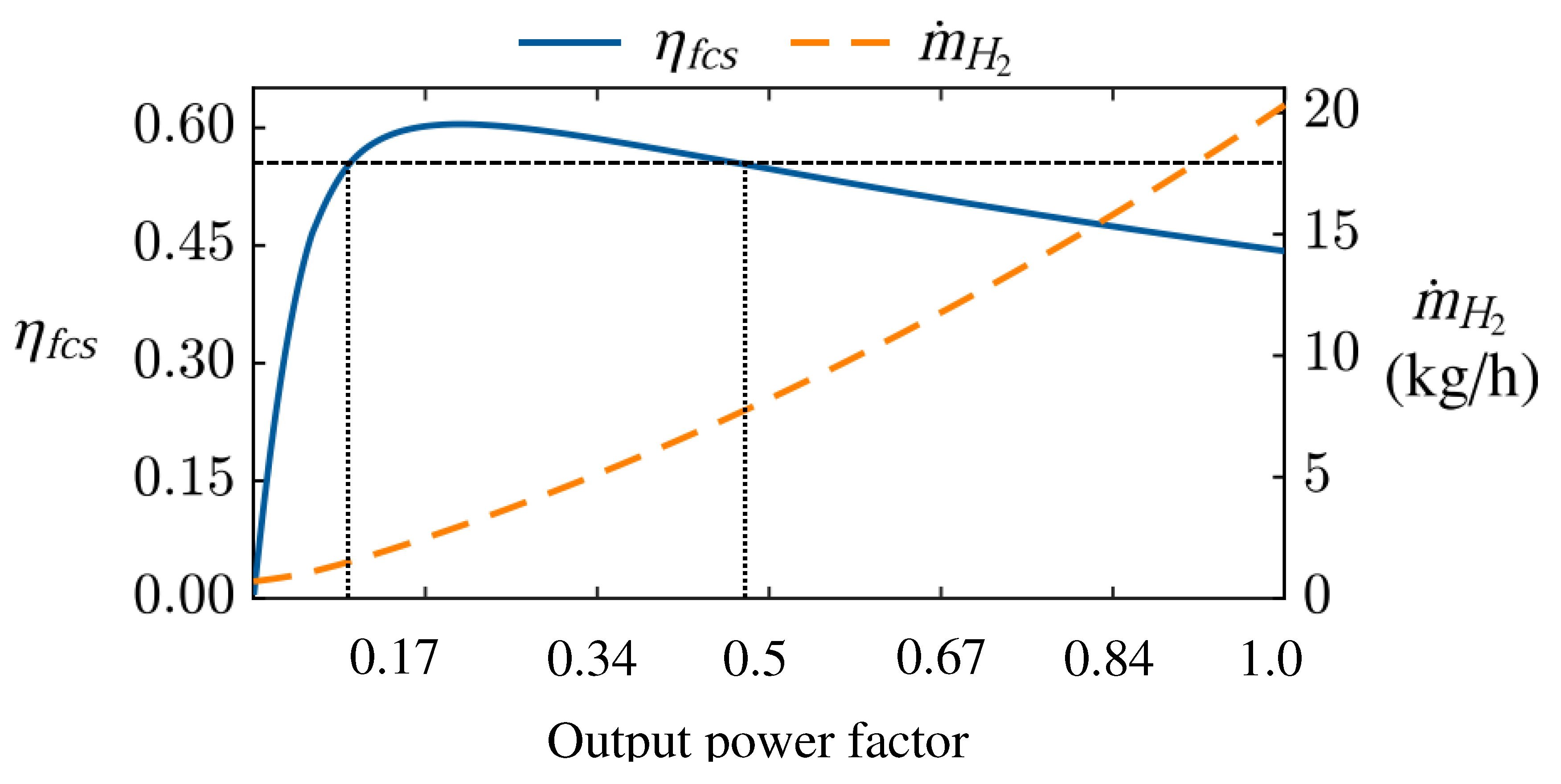
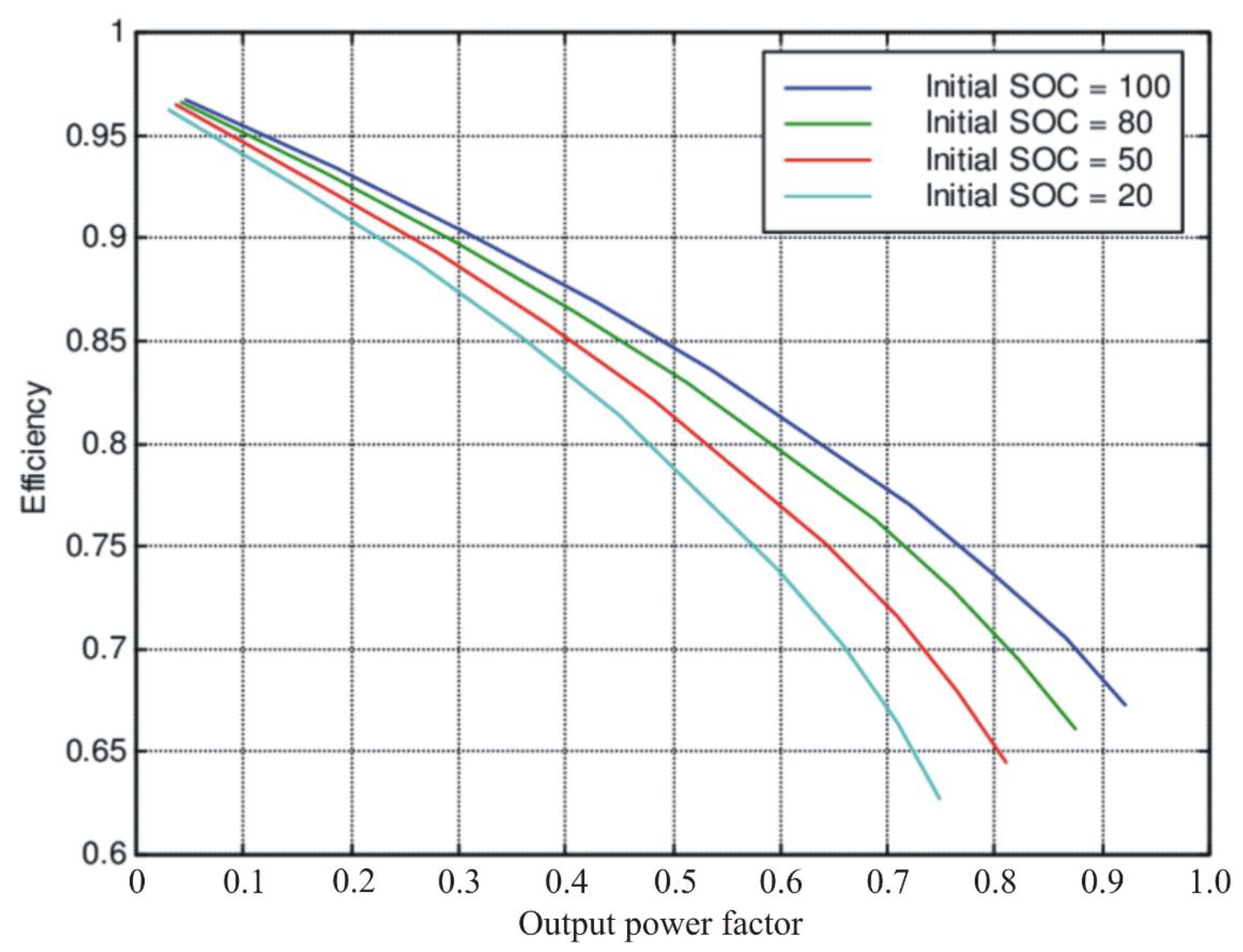
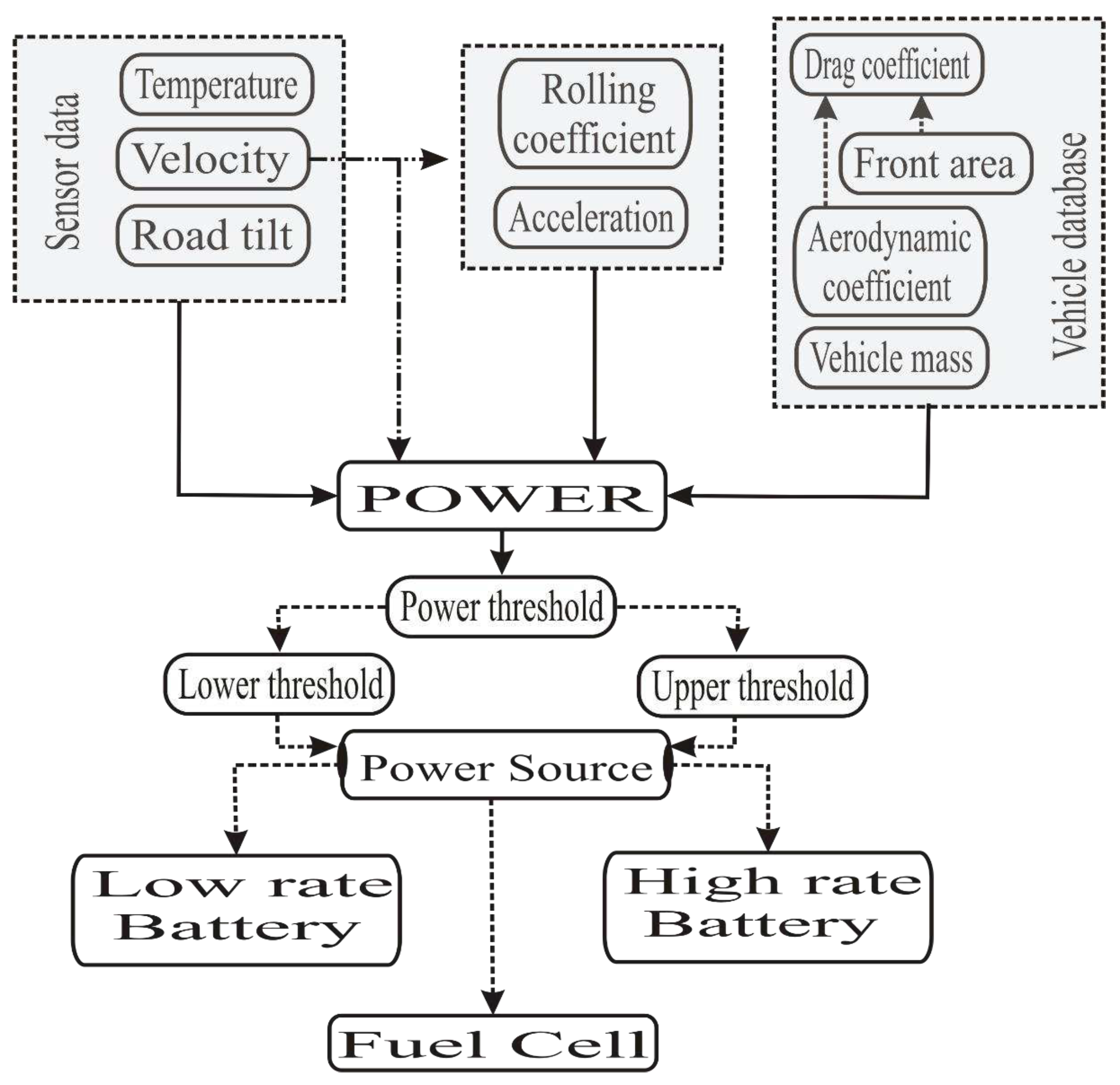
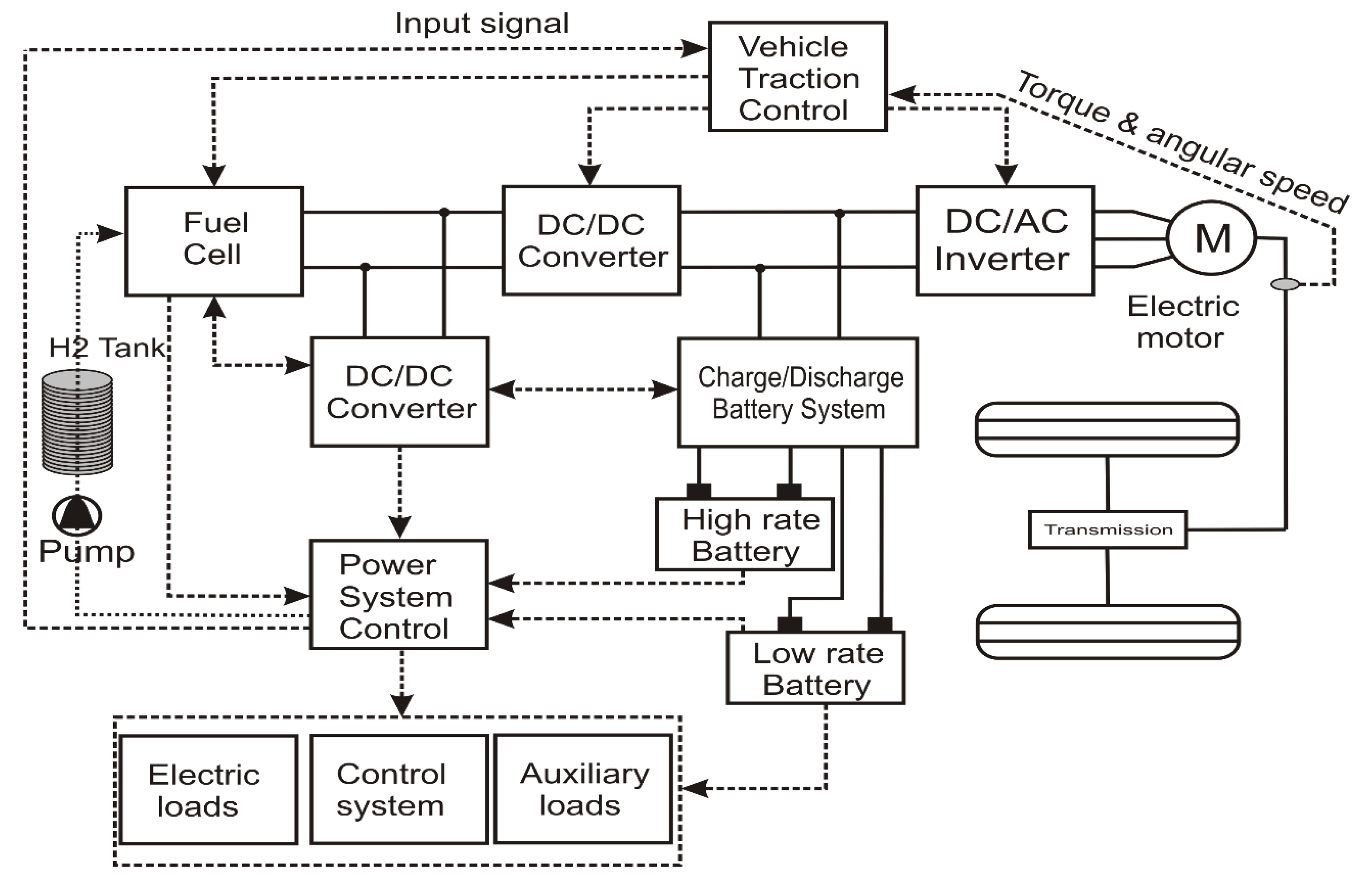
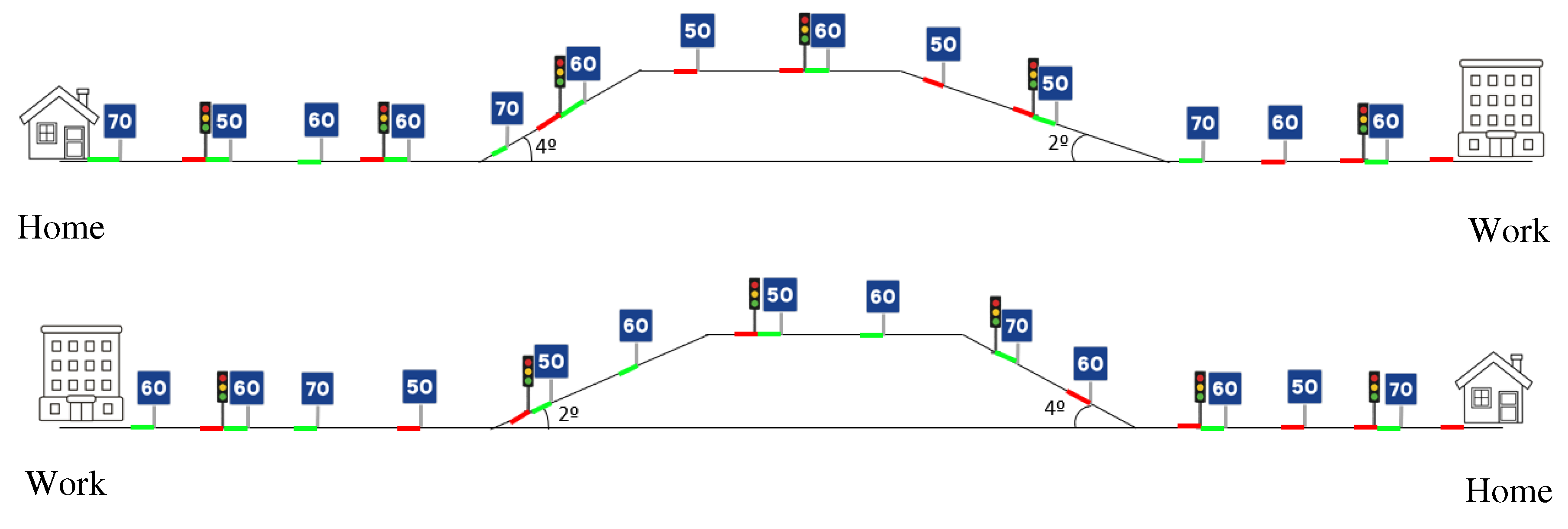
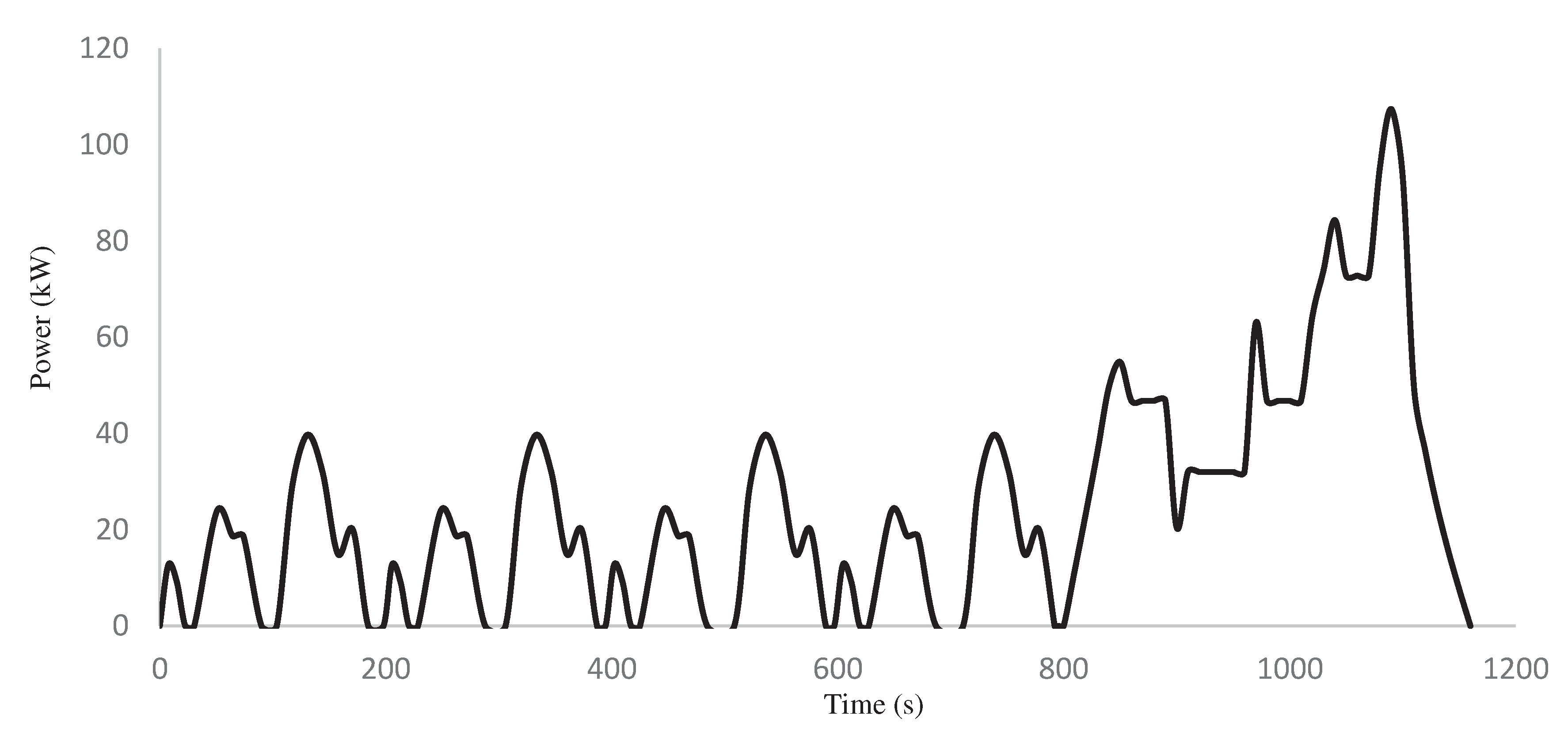
| Parameter | Unit | Symbol | Value |
|---|---|---|---|
| Weight | kg | m | 1644 |
| Front area | m2 | S | 2.5 |
| Aerodynamic coefficient | --- | Cx | 0.30 |
| Rolling coefficient | --- | μ | 0.015 |
| Air density | kg/m3 | ρ | 1.133 |
| Power demand range (kW) → | 0-10.6 | 10.6-50.9 | 50.9-106 |
| Power source configuration | |||
| A | Low rate battery | Fuel Cell | |
| B | Fuel Cell | High rate battery | |
| C | Fuel Cell | High rate battery | |
| D | Low rate battery | Fuel Cell | High rate battery |
| Configuration | A | B | C | D |
|---|---|---|---|---|
| Low | 7,686 | 57,803 | 57,803 | 7,686 |
| Medium | 86,655 | 40,410 | 86,655 | 86,655 |
| High | 31,854 | 15,269 | 15,269 | 15,299 |
| Total | 126,195 | 113,482 | 159,727 | 109,641 |
| Configuration | Low rate battery | Fuel Cell | High rate battery |
|---|---|---|---|
| A | 7.7 | 118.5 | --- |
| B | --- | 57.8 | 55.7 |
| C | --- | 144.5 | 15.3 |
| D | 7.7 | 86.7 | 15.3 |
| Configuration | A | B | C | D |
|---|---|---|---|---|
| Low | 118.1 | 29.9 | 194.8 | 72.1 |
Disclaimer/Publisher’s Note: The statements, opinions and data contained in all publications are solely those of the individual author(s) and contributor(s) and not of MDPI and/or the editor(s). MDPI and/or the editor(s) disclaim responsibility for any injury to people or property resulting from any ideas, methods, instructions or products referred to in the content. |
© 2024 by the authors. Licensee MDPI, Basel, Switzerland. This article is an open access article distributed under the terms and conditions of the Creative Commons Attribution (CC BY) license (http://creativecommons.org/licenses/by/4.0/).





